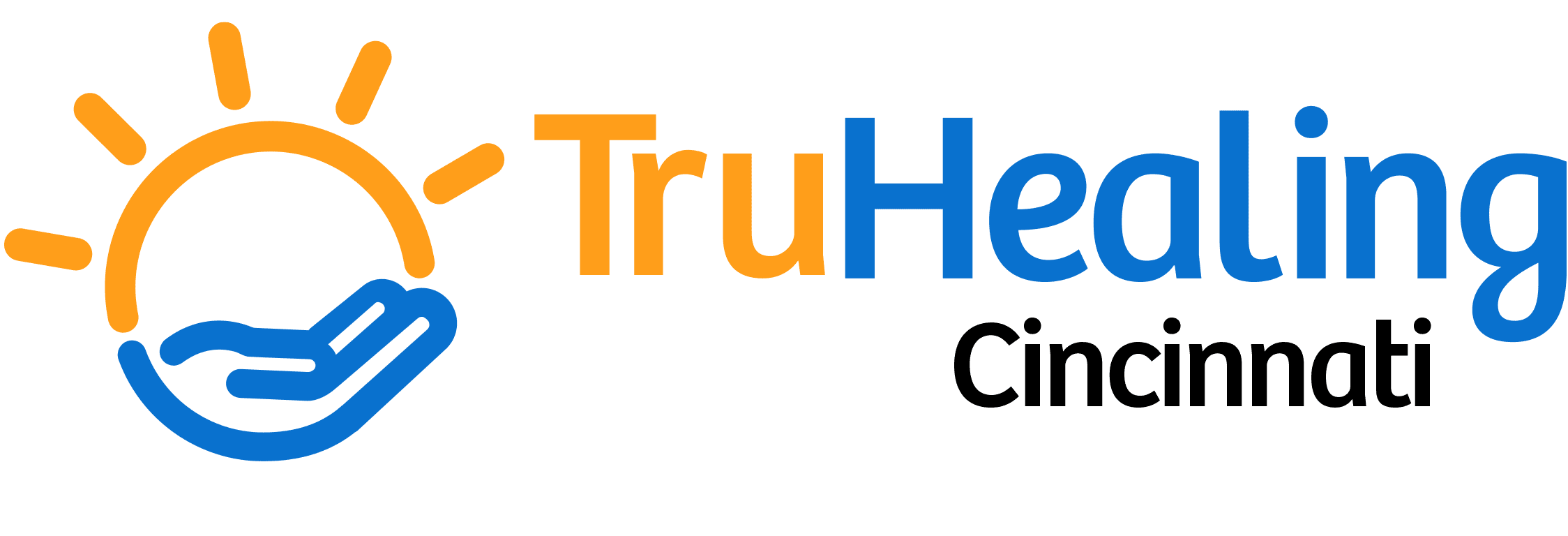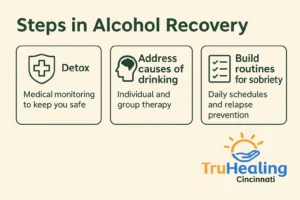When You’re Ready—But Still Scared
You’ve probably been thinking about this for a while.
Maybe you’ve Googled treatment centers late at night, or whispered to yourself, “I can’t keep living like this.” You might not even be drinking every day—but you know, deep down, alcohol has taken more from your life than it’s given.
If that’s where you are, you’re not alone. And you don’t have to guess what happens next.
At TruHealing Cincinnati, we help people just like you—people who are scared, unsure, and not totally convinced this will work—find real support, safety, and the possibility of something better.
Here’s what that looks like.
Treatment Is Not a Sentence. It’s a Starting Point.
Let’s get this out of the way first: you are not broken.
Alcohol addiction treatment isn’t about labeling you or forcing you to be someone you’re not. It’s about giving you space to feel again—to breathe, to think clearly, and to move toward a version of your life that doesn’t revolve around drinking.
Treatment isn’t a one-size-fits-all program. At TruHealing Cincinnati, we meet you where you are. Whether you need a safe place to detox, an outpatient schedule that fits your job, or long-term support to stay sober, we’re here for all of it.
Step One: Detox—What It Really Means
For many people, alcohol addiction treatment begins with detox. That word can stir up a lot of fear, especially if you’ve tried to quit on your own and felt sick, shaky, or overwhelmed.
But detox here doesn’t mean suffering in silence.
It means:
- Medical monitoring to keep you safe and stable
- Medication to ease discomfort if needed
- Rest—sometimes for the first time in a long time
Our team is trained to support you through the physical side of withdrawal so that your body can begin to heal. You’re never left alone, and you’re never expected to push through it without help.
Step Two: Understanding the “Why” Behind Drinking
Once your body begins to stabilize, the next phase of treatment is emotional and psychological healing.
This is where many people start to ask:
- Why couldn’t I stop?
- What pain or fear was I drinking to avoid?
- Who am I when I’m not drinking?
These aren’t questions you have to answer all at once. Through a combination of:
- Individual therapy
- Group therapy
- Skill-building sessions
- Trauma-informed care
—you’ll begin to peel back the layers of your story. Not for judgment, but for understanding.
You’ll learn that drinking was never the problem—it was the coping mechanism. And once we understand what it was trying to soothe, we can start building something stronger in its place.
Step Three: Building Routines That Hold You Up
You might be wondering: “What happens when I leave?”
That’s a good question—and one we plan for early on.
Treatment isn’t just about getting sober. It’s about staying sober in a life that still includes stress, relationships, jobs, and triggers.
We help you build:
- Daily routines that support your physical and emotional health
- Relapse prevention strategies that are actually realistic
- Communication skills to rebuild trust and set boundaries
- Support networks—whether that’s family, friends, or sober community
If you’re not local to Cincinnati, we can also help you connect with trusted resources near home. For example, if you’re looking for alcohol addiction treatment in Springfield, Ohio or nearby, we can coordinate continuity of care that makes sense for you.
“But I Still Don’t Know If I’m Bad Enough…”
Let’s pause here. Because if you’ve ever had that thought—you’re not alone.
Many people who need help never reach what movies call “rock bottom.” They’re still working. Still parenting. Still holding things together—on the outside.
But here’s what we know: rock bottom isn’t a place. It’s a feeling. It’s when the cost of drinking becomes heavier than the relief it gives. And if you’re there, that’s enough.
You don’t have to wait until things fall apart to ask for help. You’re allowed to want more for yourself right now.
What Treatment Feels Like Day-to-Day
We get this question a lot: “What’s a typical day like?”
Here’s a general sense of what treatment might include:
- Mornings start with check-ins, mindfulness, or group therapy
- Afternoons include skill-building workshops, individual sessions, and optional holistic care (yoga, art, etc.)
- Evenings may offer structured activities, reflection time, or family involvement if helpful
You’ll also have downtime. Time to rest, eat nourishing meals, and just breathe.
Our team is made up of people who get it—many of us have lived experience or years of walking beside people through recovery. You’re not just a “case.” You’re a human being, and you’ll be treated like one.
Alcohol Addiction Treatment in Cincinnati (and Beyond)
If you’re local to Cincinnati, our in-person care is easily accessible and deeply connected to community resources. We also serve surrounding areas—including people looking for alcohol addiction treatment in Louisville, Kentucky—and can help with transportation, coordination, and discharge planning.
We’re here to make the process easier, not harder.
Whether you’re just exploring options or ready to call, our admissions team is warm, non-judgmental, and ready to walk you through the next step—whatever that looks like.
Frequently Asked Questions About Alcohol Addiction Treatment
How long does treatment last?
It depends on what level of care you need. Detox may last a few days, while residential or outpatient programs can range from a few weeks to several months. We tailor the length to your goals, needs, and progress.
Do I have to live at the facility?
Not always. We offer outpatient options for people who can’t step away from work, family, or other responsibilities. We’ll help you find the right level of care for your situation.
Can I talk to someone before I decide?
Absolutely. Calling doesn’t commit you to anything. You can speak with a team member confidentially to ask questions, share your fears, and get honest answers.
What if I’ve already tried treatment before?
You’re still welcome here. Many people come back to treatment with new insight, readiness, or just a different level of support. One experience doesn’t define you. We’re here for another chance—not judgment.
Will I lose my job if I go to treatment?
Federal laws like the FMLA (Family and Medical Leave Act) may protect your job while you seek treatment. We can help you understand your rights and navigate communication with your employer if needed.
You’re Not Too Late, Too Broken, or Too Far Gone
Recovery doesn’t require perfection. Just honesty. Willingness. A little bit of courage.
If you’re reading this and still not sure, that’s okay. You’re already closer than you think.
At TruHealing Cincinnati, we don’t expect you to show up knowing everything. We expect you to be human. We’ll meet you there—with care, clarity, and next steps you can actually take.
Ready to Take the First Step?
Call (888) 643-9118 or visit our Alcohol Addiction Treatment page to learn more about what care looks like for you. You don’t have to do this alone—we’re here when you’re ready.


